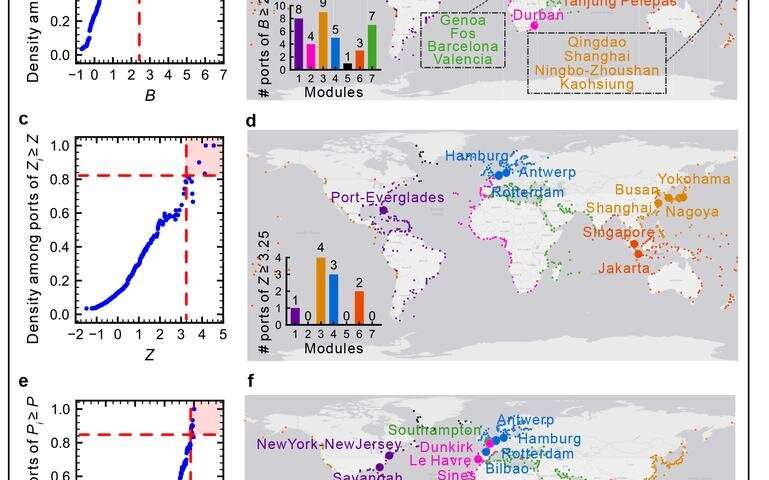#What maritime shipping can learn from brain network science
“#What maritime shipping can learn from brain network science”

Dr. Carlo Vittorio Cannistraci from TU Dresden’s Biotechnology Center (BIOTEC) is focusing his research on network science applied to biological systems and neuroscience. At the Biomedical Cybernetics Lab, he heads an translational study showing how network science computational theories used for brain analysis can help to understand global shipping networks and their impact on world economy. The study was conducted together with maritime economy scientists from China, and has now been published in the scientific journal Nature Communications.
Around 80% of global trade by volume is transported by sea, and thus the connectivity network of the maritime transportation system is fundamental to the world economy and to the functioning of society. To better exploit new international shipping routes, the current ones need to be analyzed: What are the principles behind their network organization? What mechanisms determine the complex system association with international trade? However, there is another complex system that, similarly to maritime transportation systems, links the navigability of its network structure and organization to its efficient performance in the environment. This complex system is: the brain. The motivation for this comparative and trans-disciplinary research came from the exchange during an international network science conference, followed by three years of collaborative work on the topic.
“Many complex systems share basic rules of self-organization and economical functionality. When I examined the maritime network structure of the Chinese colleagues at the conference, I advanced the hypothesis that its structure displays a trade-off between high transportation efficiency and low wiring cost, similarly to the one we know is present in brain networks. We combined our knowledge in network science, maritime science and data processing, which led to new insights into the maritime network structural organization complexity and its relevance to international trade,” explains Dr. Cannistraci, research group leader for biomedical cybernetics at BIOTEC, TU Dresden.
“An important result of this study is the development of new computational network measures for the investigation of modular connectivity and structural core organization within complex networks in general, which here we applied to maritime science. In future projects, I plan to use these newly developed methods in my research at the BIOTEC where I focus on computational and network systems in biomedicine. They might turn out to be particularly useful for brain network organization analysis and the development of markers for brain diseases, such as depression and Alzheimer’s.”
More information:
Mengqiao Xu et al. Modular gateway-ness connectivity and structural core organization in maritime network science, Nature Communications (2020). DOI: 10.1038/s41467-020-16619-5
What maritime shipping can learn from brain network science (2020, June 10)
retrieved 10 June 2020
from https://phys.org/news/2020-06-maritime-shipping-brain-network-science.html
This document is subject to copyright. Apart from any fair dealing for the purpose of private study or research, no
part may be reproduced without the written permission. The content is provided for information purposes only.
If you want to read more Like this articles, you can visit our Science category.
if you want to watch Movies or Tv Shows go to Dizi.BuradaBiliyorum.Com for forums sites go to Forum.BuradaBiliyorum.Com




